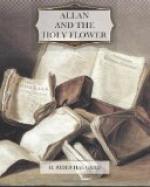“Oh! pray don’t, Mr. Quatermain. Why should you not speak of what will be in all the papers. Yes, father, I have bought a very fine specimen, the finest known, or at least Woodden has on my behalf, while I was hunting for you, which comes to the same thing.”
“Indeed, Stephen, and what did you pay for this flower? I have heard a figure, but think that there must be some mistake.”
“I don’t know what you heard, father, but it seems to have been knocked down to me at £2,300. It’s a lot more than I can find, indeed, and I was going to ask you to lend me the money for the sake of the family credit, if not for my own. But we can talk about that afterwards.”
“Yes, Stephen, we can talk of that afterwards. In fact, as there is no time like the present, we will talk of it now. Come to my office. And, sir” (this was to me) “as you seem to know something of the circumstances, I will ask you to come also; and you too, Blockhead” (this was to Woodden, who just then approached with the plant).
Now, of course, I might have refused an invitation conveyed in such a manner. But, as a matter of fact, I didn’t. I wanted to see the thing out; also to put in a word for young Somers, if I got the chance. So we all departed from that room, followed by a titter of amusement from those of the company who had overheard the conversation. In the street stood a splendid carriage and pair; a powdered footman opened its door. With a ferocious bow Sir Alexander motioned to me to enter, which I did, taking one of the back seats as it gave more room for my tin case. Then came Mr. Stephen, then Woodden bundled in holding the precious plant in front of him like a wand of office, and last of all, Sir Alexander, having seen us safe, entered also.
“Where to, sir?” asked the footman.
“Office,” he snapped, and we started.
Four disappointed relatives in a funeral coach could not have been more silent. Our feelings seemed to be too deep for words. Sir Alexander, however, did make one remark and to me. It was:
“If you will remove the corner of that infernal tin box of yours from my ribs I shall be obliged to you, sir.”
“Your pardon,” I exclaimed, and in my efforts to be accommodating, dropped it on his toe. I will not repeat the remark he made, but I may explain that he was gouty. His son suddenly became afflicted with a sense of the absurdity of the situation. He kicked me on the shin, he even dared to wink, and then began to swell visibly with suppressed laughter. I was in agony, for if he had exploded I do not know what would have happened. Fortunately, at this moment the carriage stopped at the door of a fine office. Without waiting for the footman Mr. Stephen bundled out and vanished into the building—I suppose to laugh in safety. Then I descended with the tin case; then, by command, followed Woodden with the flower, and lastly came Sir Alexander.




